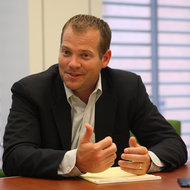Amazon.com is slowly building a library of streaming television shows and movies to rival that of Netflix, much to the satisfaction of media companies like Time Warner and CBS, Brian Stelter writes. Amazon will not unveil its own original shows until fall at the earliest, but it has spent hundreds of millions of dollars to win exclusive Web rights on shows for its Amazon Prime streaming service, like “Downton Abbey” from PBS and “Falling Skies” from TNT. Amazon is a long way from matching Netflix in terms of TV and movie selection, but parts of the media business already see the company as Pepsi to Netflix’s Coke. Other companies, including Google, Sony, Intel and a new venture by Redbox and Verizon, are scrambling for a Snapple or Red Bull.
Watching cat videos online has become a euphemism for wasting time, even if one is not actually watching popular Web felines like Maru or Henri. Advertisers have turned to the genre to sell Litter Genie, a cat-waste receptacle that neutralizes odors, Andrew Adam Newman reports. The third in a series of irreverent music videos promoting the brand has been released on YouTube (the first two videos have over 1 million views apiece.) A gray tabby named Walter is featured in all three videos and a television spot for Litter Genie.
The plot of the television show “Made in Japan” echoes the very real economic angst of that nation, Hiroko Tabuchi explains. The three-part series, broadcast on NHK, focuses on Takumi Electronics, a fictional company whose lead in television and mobile phones has been eclipsed by more nimble upstarts in China and South Korea. So Takumi Electronics turned to manufacturing more efficient lithium-ion batteries, like the actual company GS Yuasa, which made the batteries that have grounded Boeing’s Dreamliner. The show ends with Takumi Electronics teaming up with a Chinese competitor to build safer batteries. The issues with the Dreamliner have yet to be resolved.
ABC won the rights to the first on-camera interview with Amanda Knox, an American college student who was convicted of murdering her housemate in Italy while studying abroad in 2009; the conviction was overturned in 2011. The interview will be conducted by Diane Sawyer, the anchor of ABC’s “World News,” and will air during prime time on April 30, Brian Stelter writes. Ms. Knox’s case attracted a great deal of news coverage because of lurid sexual details attached to the case coupled with her appearance as an attractive girl next door. The interview will coincide with the release of Ms. Knox’s book, “Waiting to be Heard,” published by HarperCollins.
Univision and ABC News are both backing a new channel called Fusion that will target English-speaking Latinos in the United States, Amy Chozick reports. The channel will premiere this summer and will test whether second-generation Latinos want to watch television created specifically for them. But creating a 24-hour cable channel for a relatively narrow audience with many options in English and Spanish is a risky proposition — studies show that English-speaking Latinos tend to watch the same programs as non-Hispanics.
